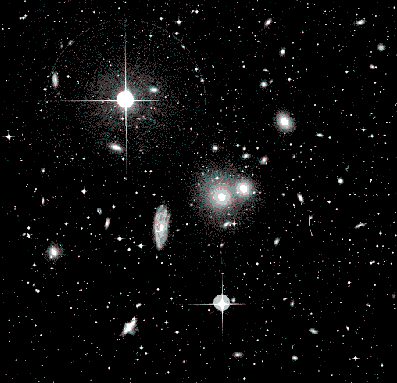Astronomy Picture of the Day
Discover the cosmos!
Each day a different image or photograph of our fascinating universe is
featured, along with a brief explanation written by a professional
astronomer.
August 1, 1996

The Hydra Cluster of Galaxies
Credit: Digitized Sky Survey
(ROE),
SkyView
Copyright:
STScI,
AAO, UK-PPARC, ROE
Explanation:
You are flying through space and come to ... the Hydra Cluster of Galaxies.
Listed as Abell 1060, the
Hydra
Cluster contains well over 100 bright galaxies.
Clusters of galaxies are the
largest gravitationally-bound objects in the
universe. All of the bright extended
images in the above picture are galaxies in the Hydra Cluster with the
exception of unrelated
diffraction crosses centered on bright stars. Several proximate
clusters
and
galaxy groups
might together create an even larger entity - a
supercluster
- but these clumps of matter are not (yet) falling toward each other. In
fact, the Hydra cluster is thought to be part of the Hydra-Centaurus Supercluster of galaxies. Similarly, our own
Milky Way Galaxy is part of the
Local Group of Galaxies which is
part of the
Virgo
Supercluster of Galaxies.
Tomorrow's picture: Galileo, Cassini, and the Great Red Spot
| Archive
| Index
| Search
| Glossary
| Education
| About APOD |




Authors & editors:
Robert Nemiroff
(MTU) &
Jerry
Bonnell (USRA).
NASA Technical Rep.:
Sherri
Calvo.
Specific rights apply.
A service of:
LHEA
at
NASA/
GSFC




